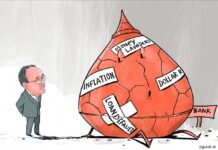
Four decades of the phenomenal growth of Bnagladesh’s readymade garment (RMG) industry since the 1980s is likely to falter due to the unreliable supply of electricity and gas. An abrupt rise in the price of fuel for power generation and transportation; and volatility of the exchange rate may push the apparel exports industry over the precipice.
The growth of the export-oriented RMG industry in Bangladesh has so far depended on the availability of low-priced natural gas that provided an added advantage to the competitive edge from the abundant supply of low-wage labour.
In 1983-84, RMG exports of USD 31.5 Million accounted for a meagre 3.89 percent of the total exports of Bangladesh. At the beginning of the 1990s, export of apparel crossed the billion-dollar mark comprising more than half of the total volume of exports. Growing at an annual average of 25 percent, the export of apparel reached USD 42.6 Billion in 2021-22; accounting for more than 80 percent of the total exports of Bangladesh. In 2021, the GDP growth rate picked up pace at five percent with a “rebound of exports” driven by the “recovery of external demand” in the European and North American markets.
However, optimism surrounding an early recovery from the pandemic turned sour due to the Russian invasion of Ukraine on February 24, 2022. Subsequently, the rise of oil, commodity, and food prices impacted heavily upon the consumer markets in the EU, the UK, and North America. The majority of export destinations for Bangladeshi apparel have similarly experienced an economic downturn and prospects for the coming days do not seem to indicate any good news.
Since EU member countries import almost half of the apparel exported from Bangladesh, the depression in the economies of Europe is a cause of serious concern. Germany is one of the major markets in the EU for apparel from Bangladesh. Due to the US and EU sanctions on Russia, the German economy is currently experiencing a dilemma over the supply of energy. Consumers are bent on conserving energy and are concerned about the high heating bills for the coming winter. The country is grappling with declining consumer confidence because of the high inflation rates and fears of a looming recession that does not bode well for Bangladeshi exporters.
The US is the single largest destination of apparel. Unemployment is at its lowest at 3.5 percent in the US, and the government is going to increase the interest rate to bring down the inflation rate hovering above 8.2 percent and stave off a recession looming on the horizon. President Biden is doing his best to bring down the price of gasoline. Lower oil prices may lead to the normalisation of the demand and supply situation which may be good for business and Bangladeshi exporters, as well. However, as a consequence of the persistence of high oil and food prices disposable income will tend to be less, leaving very little for spending on apparel and fashion.
Demand for Bangladeshi apparel in India, Australia, New Zealand, and the oil-exporting countries of the Middle East is expected to hold steady. Markets of South America may be less vulnerable to the after-effects of the war in Europe since the dependence on oil and food is not so much dependent on the European suppliers but dependent on suppliers of the region. Exports to South Africa and India are expected to hold steady. Russian import is up in the air due to the war in Europe and domestic discontentment. However, Bangladeshi exports may still be eligible for favourable terms from the Russians because of mutual economic and political interests.
Apparel exporters are faced with the dilemma of a shrinking demand overseas and a sharp rise in the cost of production. It seems the latter is a greater threat to the industry than a shrinking market. A deep sense of frustration seems to be rising amongst the apparel exporters of Bangladesh over the half-measures of the government in responding to the irregular supply of electricity and fuel. The fuel price hike is causing a multiplier effect on the cost of production and transportation. A thorough analysis of the costs and benefits of the withdrawal of the subsidy on fuel may be recommended in light of the serious consequences of high fuel prices on the economy.
The demand for energy security is urgent and needs to be reviewed at the highest echelons of the government by credible experts, since ensuring a steady supply of energy is key to the maintenance of the growth momentum and avoidance of an impending economic crisis.
Sheikh Rahman is a managing partner at Enertech International Inc.










